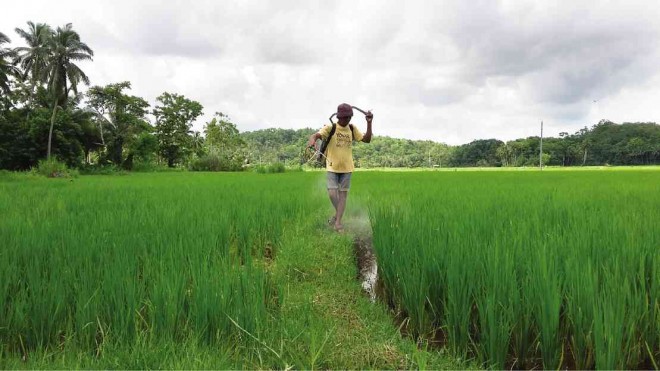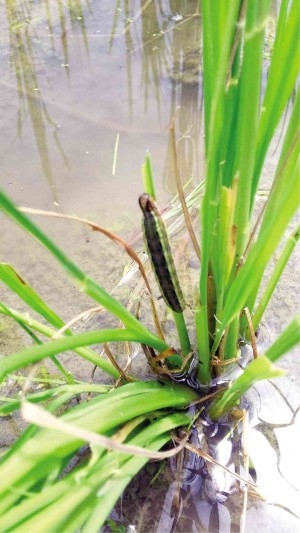Armyworms attack rice fields in Bohol

INSECT WAR Eusebio Tinay, a 65-year-old farmer, sprays insecticide to kill armyworms which have invaded his rice field in Batuan, Bohol province. PHOTOS BY LEO UDTOHAN/INQUIRER VISAYAS
TAGBILARAN CITY—Armyworms have raided rice fields in four towns in Bohol province, the rice bowl of Central Visayas, and authorities have directed farmers to immediately notify them of the insects’ presence to reduce crop losses.
Larry Pamugas, acting head of the Provincial Agriculturist Office (PAO), said damage to crops on Carlos P. Garcia Island (CPG) and in Mabini, Loon and Batuan was still being assessed, but added that the situation was manageable.
Similar infestation was reported in rice farms in several towns in Pangasinan province last week.
Armyworms (Mythimna separata) or cutworms, which are actually caterpillar larvae of northern or oriental armyworm moths of the Noctuidae family, travel in multitudes, destroying any kind of vegetation, including grasses and grains, on their path. Once the food supply is exhausted, the entire “army” moves to the next available food source.
They feed on rice by cutting off leaves and young seedlings at the plant’s base, according to a fact sheet provided by the PAO. They attack at night and hide during the day.
Pamugas could not explain why the armyworm outbreak occurred at this time of the year, saying the insects usually appear after a dry spell. The pests were also found in rain-fed areas.
Their presence was first observed a month ago in CPG and Mabini and they spread to other areas, Pamugas said.
In Batuan, the armyworms have swept farms in Barangays Poblacion Sur, Cantigdas and Santa Cruz.
Eusebio Tinay, 65, a farm worker of Cantigdas for over two decades, said he would use insecticide supplied by his landlord to control the infestation.
Tinay said he would harvest 60 sacks of palay from his 1-hectare farm, but after the armyworm attack, he was expecting only 20 sacks. “It will be a large financial loss,” he said.
For Romnick Dabas, 20, a farmer in Poblacion Sur who cannot afford to buy insecticide, said he picks out the inch-long worms by hand from his half-hectare field.
“The rice crop is severely damaged, that’s why I don’t hope for a better harvest,” he said.
Dabas seemed resigned to what happened to his farm. No matter how good you handle the preparation, pests and diseases are inevitable, he said, pointing out that he also contended with other predators, such as the “pingajaw” or “pyangaw” (rice black bug), “ilaga” (rat), “maya” (bird), “kuhol” (golden snail) and “suhong” (mole cricket).
Julito Gumapac, Batuan municipal agriculturist, said in a letter to Mayor Francisco Pepito on Tuesday that he had already asked for chemicals from the Department of Agriculture, but his office could not serve all areas affected due to limited supply.
“This worm infestation, if not stopped, would likely spread, causing a major pest outbreak in areas planted with rice and other crops,” Gumapac said, as he asked the mayor to use the municipality’s general funds to purchase pesticides and sprayers.
Bohol produces 66 percent of the total rice output in Central Visayas. Of the total area of rice farms placed at 47,375 hectares, 23,041 ha are irrigated and 24,336 ha are rain-fed.
The nonprofit Sibol ng Agham at Teknolohiya, in its climate change and rice reports in 2011, said an armyworm outbreak damaged almost all of the rice areas of Ubay town in 1985. Another attack was recorded in 1999, destroying 40 percent of new rice farms, it said.
The provincial government has sent farm technicians to the affected towns to help farmers contain the infestation through the Assistance for Barangay Agricultural Growth, a collaborative project of the provincial agriculturist’s office and a partner organization.















